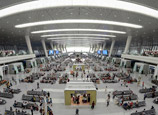
CAIRO, June 2 (Xinhua) -- The position of Egyptian President Mohamed Morsi is getting all the more unstable as increasing Western pressures urge the Islamist-oriented president to listen to the demand of protesters, local political experts said.
Morsi is now facing a wave of protests nationwide that request him to step down and ask for an early presidential election. Despite being in their millions, his supporters, mostly Islamists, are greatly outnumbered by his opponents, who flood the country's main streets and public squares, vowing no return before his ouster.
On Monday, the Egyptian army gave all rival parties a 48-hour deadline to resolve the ongoing political conflict, or it would impose a roadmap for the future of the chaos-stricken country.
U.S. President Barack Obama made a phone call to Morsi early Tuesday morning to convey his concerns about the recent developments in Egypt, the White House said.
"The United States is committed to the democratic process in Egypt and does not support any single party or group," Obama told Morsi.
"He (Obama) stressed democracy is about more than elections," encouraging Morsi to take "responsive" steps to the many anti- president protesters throughout the country and underscoring "deep concern" about possible violence during the demonstrations.
Also on Tuesday, spokesman of the UN High Commissioner for Human Rights, Rupert Colville, said "we call on the president of Egypt to listen to the demands and wishes of the Egyptian people."
French Foreign Minister Laurent Fabius similarly urged Morsi to "listen" to the protesters' demands.
Sobhi Essaila, political expert with Al-Ahram Center for Political and Strategic Studies, told Xinhua that "it seems that the United States has made its decision to give up Morsi and the Muslim Brotherhood (MB)."
Essaila said Morsi is not only facing "Western pressures," but he is also squeezed by "internal dissatisfaction of his own men, represented in the resignation of several key ministers and officials."
He also expressed his belief that Morsi's administration "had already decayed," noting that even if Morsi offers to hold a referendum over his stay, "it has become too late."
"The only way to rescue himself and his group is to hold an early presidential election so that the MB could still be part of the political equation," said the expert.
The West's concerns grew after clashes between Morsi's opponents and proponents killed at least 24 and injured more than 1,200 over the past week. Confrontations continued on Tuesday, killing at least seven and injuring over 200 as the countdown for the military's ultimatum is ticking.
Ahmed al-Fadali, political expert and general coordinator of the Independent Current, said the West and the United States usually cover their support for any regime under support of its own people.
"When this cover is removed by public anger, the United States and the West do not have another option but to go with the pulse of the streets," Fadali, who represents 30 political parties, told Xinhua.
Fadali, also head of the Democratic Peace Party, echoed Essaila 's opinion that Morsi had become the weaker side of the equation. "Perhaps he is even out of the equation as it were."
He added that even if Morsi refuses to quit, he actually has already been sacked by millions of people who took to the streets against him on June 30.
"The scene would have been too dangerous without the armed forces," Fadali stressed, adding that the best way for Morsi is to resign within the coming few hours, before the army's ultimatum is over.
However, in a televised speech on Tuesday night, Morsi said there would be no alternative for legitimacy and that he would pay his life as price for it.
Political science professor Tharwat Badawi told Xinhua that he expects Morsi to try to reach an understanding with his rivals instead, otherwise there would be "rivers or seas of bloodshed."
Badawi blamed the ongoing conflicts on a broad U.S.-Israeli plot to control the region and guarantee the security of Israel " which will not be achieved with the rise of an Arab country like Egypt."
















 China's weekly story (2013 6.22-6.28)
China's weekly story (2013 6.22-6.28)


![]()
